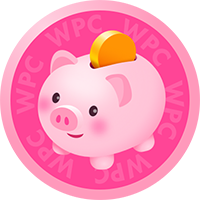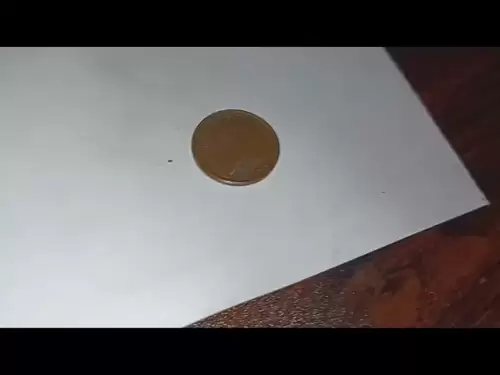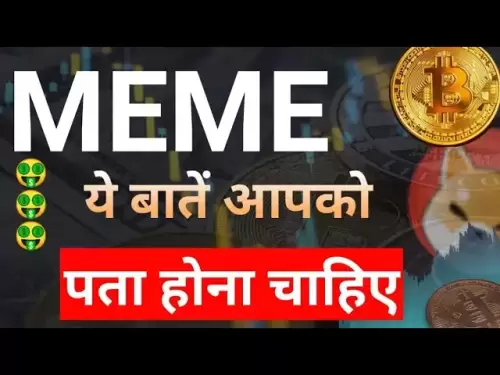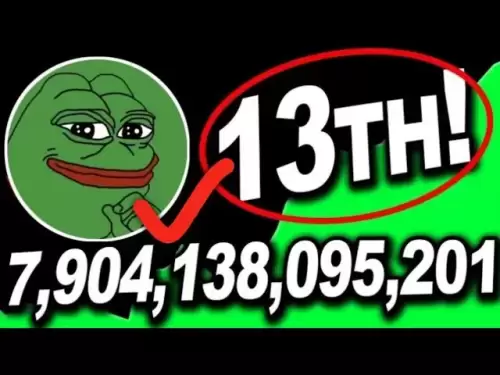-
 Bitcoin
Bitcoin $106,754.6083
1.33% -
 Ethereum
Ethereum $2,625.8249
3.80% -
 Tether USDt
Tether USDt $1.0001
-0.03% -
 XRP
XRP $2.1891
1.67% -
 BNB
BNB $654.5220
0.66% -
 Solana
Solana $156.9428
7.28% -
 USDC
USDC $0.9998
0.00% -
 Dogecoin
Dogecoin $0.1780
1.14% -
 TRON
TRON $0.2706
-0.16% -
 Cardano
Cardano $0.6470
2.77% -
 Hyperliquid
Hyperliquid $44.6467
10.24% -
 Sui
Sui $3.1128
3.86% -
 Bitcoin Cash
Bitcoin Cash $455.7646
3.00% -
 Chainlink
Chainlink $13.6858
4.08% -
 UNUS SED LEO
UNUS SED LEO $9.2682
0.21% -
 Avalanche
Avalanche $19.7433
3.79% -
 Stellar
Stellar $0.2616
1.64% -
 Toncoin
Toncoin $3.0222
2.19% -
 Shiba Inu
Shiba Inu $0.0...01220
1.49% -
 Hedera
Hedera $0.1580
2.75% -
 Litecoin
Litecoin $87.4964
2.29% -
 Polkadot
Polkadot $3.8958
3.05% -
 Ethena USDe
Ethena USDe $1.0000
-0.04% -
 Monero
Monero $317.2263
0.26% -
 Bitget Token
Bitget Token $4.5985
1.68% -
 Dai
Dai $0.9999
0.00% -
 Pepe
Pepe $0.0...01140
2.44% -
 Uniswap
Uniswap $7.6065
5.29% -
 Pi
Pi $0.6042
-2.00% -
 Aave
Aave $289.6343
6.02%
List of Request (REQ) coin issuance and listed trading platforms
REQ tokens, ERC-20 compatible and available on both Ethereum mainnet and testnet, can be traded on various centralized and decentralized exchanges and stored in non-custodial wallets like MetaMask or hardware wallets such as Trezor Model T.
Dec 24, 2024 at 12:56 am
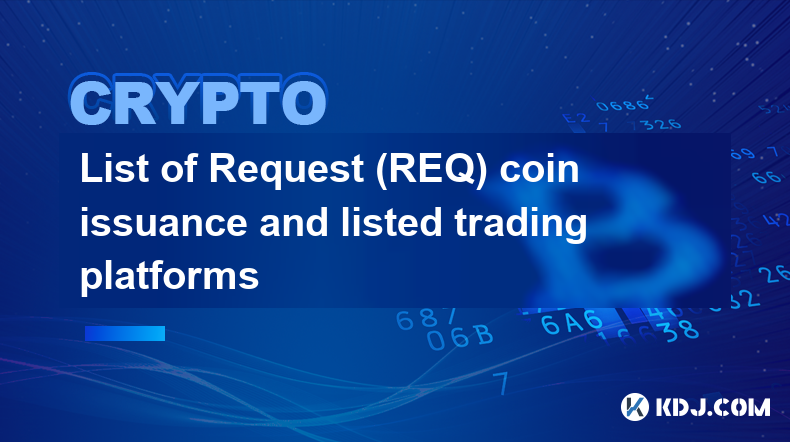
Key Points:
- REQ Token Distribution: Overview of the initial token distribution and subsequent allocations.
- Centralized Exchange Listings: A comprehensive list of centralized exchanges where REQ is available for trading.
- Decentralized Exchange Listings: A detailed table of decentralized exchanges supporting REQ trading.
- Non-Custodial Wallet Integrations: Information on wallets that support REQ storage and management.
- Token Standards and Networks: Explanation of the token standards and networks used by REQ.
REQ Token Distribution
- Initial Coin Offering (ICO): In 2017, Request Network sold 1.1 billion REQ tokens through an ICO, raising approximately $74 million.
- Team Allocation: 10% of tokens were reserved for the Request Network team.
- Foundation Allocation: 10% were allocated to the Request Network Foundation for ecosystem development.
- Presale and Seed Funding: 10% were sold in private presales and seed funding rounds prior to the ICO.
- Bounty Program: 1% was allocated for bug bounty programs and developer incentives.
Centralized Exchange Listings
- Binance: One of the largest cryptocurrency exchanges, Binance is a trusted platform for trading REQ with high liquidity.
- KuCoin: A popular exchange known for its low trading fees and support for a wide range of cryptocurrencies, including REQ.
- Huobi: Another major exchange with a global presence, Huobi offers a variety of trading options and supports REQ trading.
- OKEx: A highly respected exchange, OKEx is known for its advanced trading tools and deep liquidity in REQ trading.
- Crypto.com: A versatile platform that combines a cryptocurrency exchange with a wallet and card service, Crypto.com allows users to buy, sell, and trade REQ.
Decentralized Exchange Listings
- Uniswap: A decentralized exchange built on the Ethereum network, Uniswap allows for automated and peer-to-peer REQ trading.
- Balancer: A multi-asset DEX, Balancer provides liquidity pooling and automated market making for REQ trades.
- SushiSwap: Another popular DEX on Ethereum, SushiSwap offers various trading mechanisms and community governance features.
- KyberSwap: A non-custodial DEX, KyberSwap enables atomic swaps and instant REQ token conversions.
- 1inch: A decentralized exchange aggregator, 1inch scans multiple DEXs to find the best rates for REQ trades.
Non-Custodial Wallet Integrations
- MetaMask: A popular browser extension wallet, MetaMask is compatible with Ethereum and supports REQ token storage.
- Trust Wallet: A mobile wallet available for iOS and Android, Trust Wallet provides secure storage and transaction management for REQ.
- Ledger Nano X: A hardware wallet from Ledger, Nano X offers offline storage and advanced security features for REQ tokens.
- Trezor Model T: Another highly regarded hardware wallet, Trezor Model T provides tamper-proof storage and multi-signature support for REQ.
- MyEtherWallet (MEW): An open-source browser wallet, MEW allows users to manage their REQ tokens and interact with Ethereum-based applications.
Token Standards and Networks
- ERC-20 Standard: REQ is an ERC-20 token, meaning it resides on the Ethereum network and adheres to the ERC-20 token standard.
- Mainnet and Testnet: REQ tokens exist on both the Ethereum mainnet (live network) and testnet (testing network).
FAQs Related to REQ
Q: What is Request Network?
- A: Request Network is a decentralized protocol that enables creation, tracking, and fulfillment of payments and requests. It uses blockchain technology to provide transparency, security, and efficiency.
Q: What is the purpose of REQ tokens?
A: REQ tokens are the native token of the Request Network. They are used to:
- Pay for request creation and fulfillment
- Stake for node rewards
- Participate in community governance
Q: How do I buy REQ tokens?
- A: REQ tokens can be purchased on centralized exchanges like Binance, KuCoin, and Huobi, or decentralized exchanges like Uniswap and Balancer.
Q: Where can I store REQ tokens?
- A: REQ tokens can be stored in non-custodial wallets such as MetaMask, Trust Wallet, or hardware wallets like Ledger Nano X and Trezor Model T.
Q: Is REQ a good investment?
- A: The potential return on investment for REQ depends on various factors such as market sentiment, adoption of the Request Network, and future developments. It's important to conduct thorough research and consider your own risk tolerance before making any investment decisions.
Disclaimer:info@kdj.com
The information provided is not trading advice. kdj.com does not assume any responsibility for any investments made based on the information provided in this article. Cryptocurrencies are highly volatile and it is highly recommended that you invest with caution after thorough research!
If you believe that the content used on this website infringes your copyright, please contact us immediately (info@kdj.com) and we will delete it promptly.
- 2025-W Uncirculated American Gold Eagle and Dr. Vera Rubin Quarter Mark New Products
- 2025-06-13 06:25:13
- Ruvi AI (RVU) Leverages Blockchain and Artificial Intelligence to Disrupt Marketing, Entertainment, and Finance
- 2025-06-13 07:05:12
- H100 Group AB Raises 101 Million SEK (Approximately $10.6 Million) to Bolster Bitcoin Reserves
- 2025-06-13 06:25:13
- Galaxy Digital CEO Mike Novogratz Says Bitcoin Will Replace Gold and Go to $1,000,000
- 2025-06-13 06:45:13
- Trust Wallet Token (TWT) Price Drops 5.7% as RWA Integration Plans Ignite Excitement
- 2025-06-13 06:45:13
- Ethereum (ETH) Is in the Second Phase of a Three-Stage Market Cycle
- 2025-06-13 07:25:13
Related knowledge

How to customize USDT TRC20 mining fees? Flexible adjustment tutorial
Jun 13,2025 at 01:42am
Understanding USDT TRC20 Mining FeesMining fees on the TRON (TRC20) network are essential for processing transactions. Unlike Bitcoin or Ethereum, where miners directly validate transactions, TRON uses a delegated proof-of-stake (DPoS) mechanism. However, users still need to pay bandwidth and energy fees, which are collectively referred to as 'mining fe...

USDT TRC20 transaction is stuck? Solution summary
Jun 14,2025 at 11:15pm
Understanding USDT TRC20 TransactionsWhen users mention that a USDT TRC20 transaction is stuck, they typically refer to a situation where the transfer of Tether (USDT) on the TRON blockchain has not been confirmed for an extended period. This issue may arise due to various reasons such as network congestion, insufficient transaction fees, or wallet-rela...

How to cancel USDT TRC20 unconfirmed transactions? Operation guide
Jun 13,2025 at 11:01pm
Understanding USDT TRC20 Unconfirmed TransactionsWhen dealing with USDT TRC20 transactions, it’s crucial to understand what an unconfirmed transaction means. An unconfirmed transaction is one that has been broadcasted to the blockchain network but hasn’t yet been included in a block. This typically occurs due to low transaction fees or network congestio...

What to do if USDT TRC20 transfers are congested? Speed up trading skills
Jun 13,2025 at 09:56am
Understanding USDT TRC20 Transfer CongestionWhen transferring USDT TRC20, users may occasionally experience delays or congestion. This typically occurs due to network overload on the TRON blockchain, which hosts the TRC20 version of Tether. Unlike the ERC20 variant (which runs on Ethereum), TRC20 transactions are generally faster and cheaper, but during...

The relationship between USDT TRC20 and TRON chain: technical background analysis
Jun 12,2025 at 01:28pm
What is USDT TRC20?USDT TRC20 refers to the Tether (USDT) token issued on the TRON blockchain using the TRC-20 standard. Unlike the more commonly known ERC-20 version of USDT (which runs on Ethereum), the TRC-20 variant leverages the TRON network's infrastructure for faster and cheaper transactions. The emergence of this version came as part of Tether’s...

How to monitor large USDT TRC20 transfers? Tracking tool recommendation
Jun 12,2025 at 06:49pm
Understanding USDT TRC20 TransfersTether (USDT) is one of the most widely used stablecoins in the cryptocurrency ecosystem. It exists on multiple blockchains, including TRON (TRC20). The TRC20 version of USDT operates on the TRON network and offers faster transaction speeds and lower fees compared to its ERC-20 counterpart on Ethereum. When discussing l...

How to customize USDT TRC20 mining fees? Flexible adjustment tutorial
Jun 13,2025 at 01:42am
Understanding USDT TRC20 Mining FeesMining fees on the TRON (TRC20) network are essential for processing transactions. Unlike Bitcoin or Ethereum, where miners directly validate transactions, TRON uses a delegated proof-of-stake (DPoS) mechanism. However, users still need to pay bandwidth and energy fees, which are collectively referred to as 'mining fe...

USDT TRC20 transaction is stuck? Solution summary
Jun 14,2025 at 11:15pm
Understanding USDT TRC20 TransactionsWhen users mention that a USDT TRC20 transaction is stuck, they typically refer to a situation where the transfer of Tether (USDT) on the TRON blockchain has not been confirmed for an extended period. This issue may arise due to various reasons such as network congestion, insufficient transaction fees, or wallet-rela...

How to cancel USDT TRC20 unconfirmed transactions? Operation guide
Jun 13,2025 at 11:01pm
Understanding USDT TRC20 Unconfirmed TransactionsWhen dealing with USDT TRC20 transactions, it’s crucial to understand what an unconfirmed transaction means. An unconfirmed transaction is one that has been broadcasted to the blockchain network but hasn’t yet been included in a block. This typically occurs due to low transaction fees or network congestio...

What to do if USDT TRC20 transfers are congested? Speed up trading skills
Jun 13,2025 at 09:56am
Understanding USDT TRC20 Transfer CongestionWhen transferring USDT TRC20, users may occasionally experience delays or congestion. This typically occurs due to network overload on the TRON blockchain, which hosts the TRC20 version of Tether. Unlike the ERC20 variant (which runs on Ethereum), TRC20 transactions are generally faster and cheaper, but during...

The relationship between USDT TRC20 and TRON chain: technical background analysis
Jun 12,2025 at 01:28pm
What is USDT TRC20?USDT TRC20 refers to the Tether (USDT) token issued on the TRON blockchain using the TRC-20 standard. Unlike the more commonly known ERC-20 version of USDT (which runs on Ethereum), the TRC-20 variant leverages the TRON network's infrastructure for faster and cheaper transactions. The emergence of this version came as part of Tether’s...

How to monitor large USDT TRC20 transfers? Tracking tool recommendation
Jun 12,2025 at 06:49pm
Understanding USDT TRC20 TransfersTether (USDT) is one of the most widely used stablecoins in the cryptocurrency ecosystem. It exists on multiple blockchains, including TRON (TRC20). The TRC20 version of USDT operates on the TRON network and offers faster transaction speeds and lower fees compared to its ERC-20 counterpart on Ethereum. When discussing l...
See all articles




















